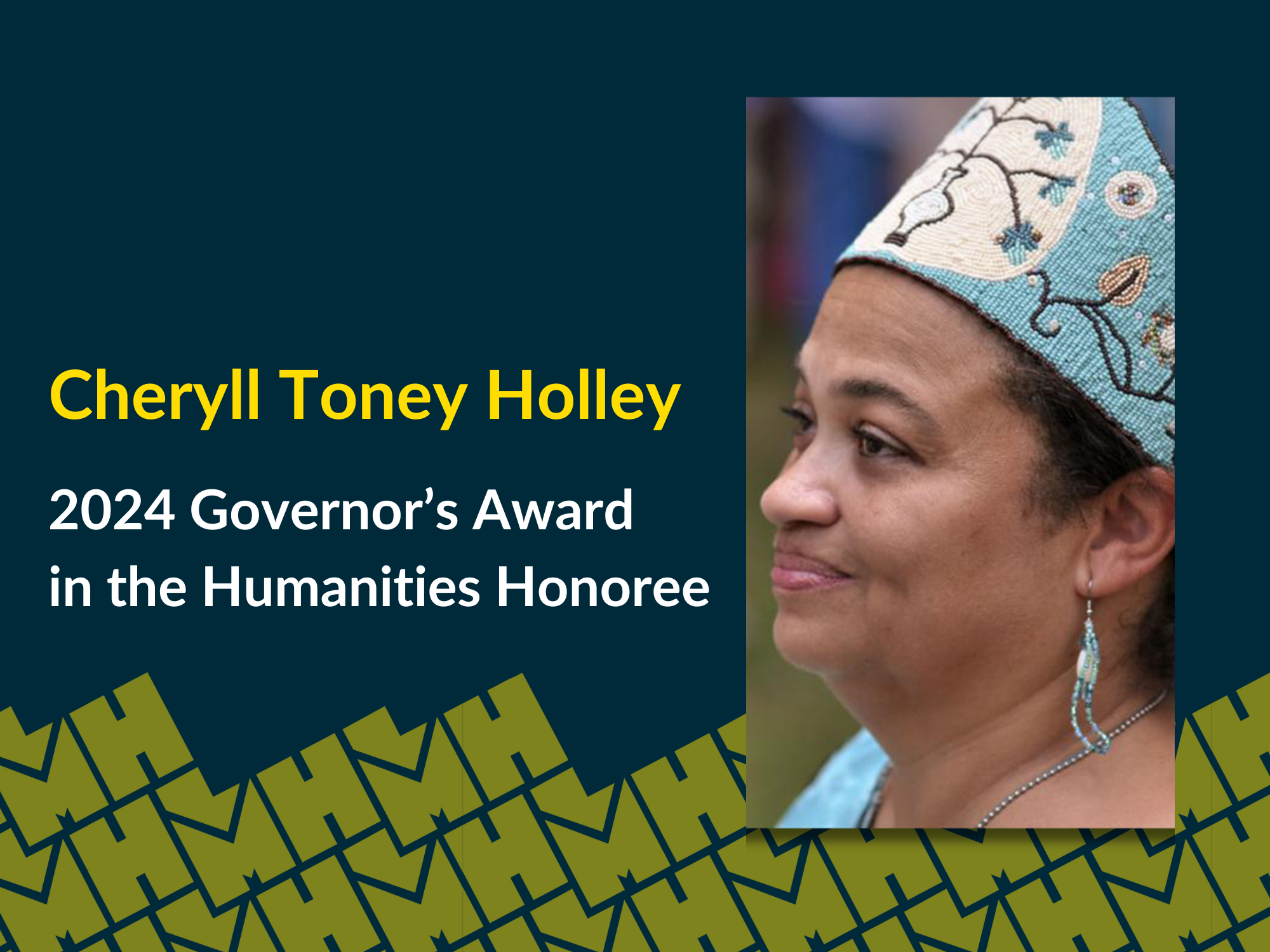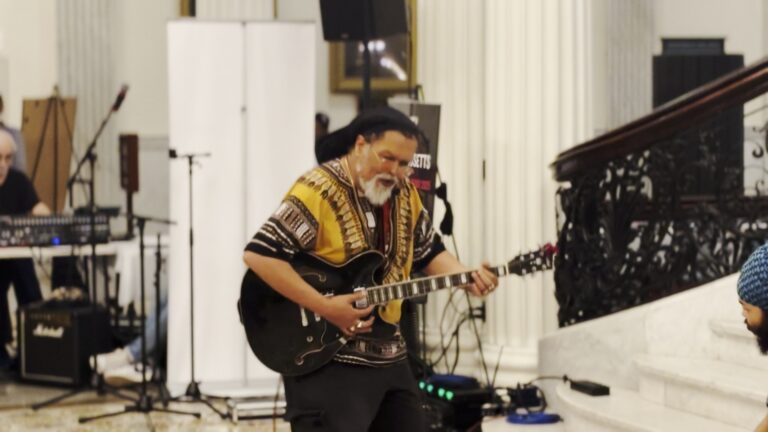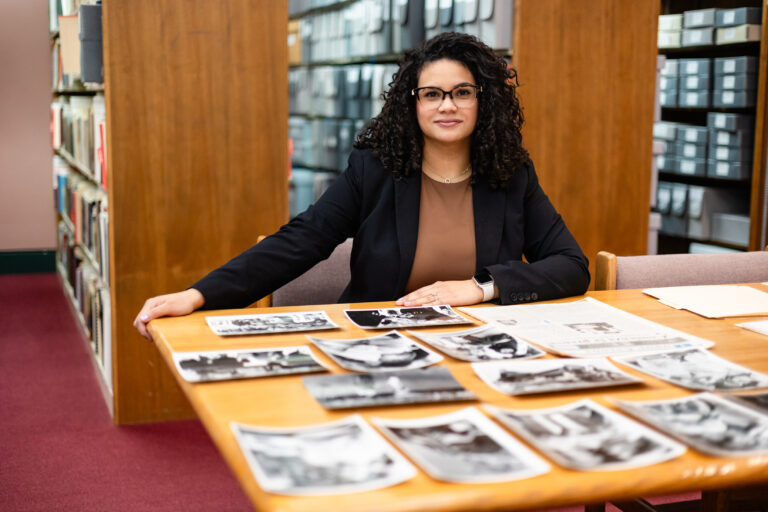If you ask Cheryll Toney Holley to introduce herself, she immediately mentions her four children and eight grandchildren, all of whom are local to the Worcester area. This is because intergenerational bonds are a central cultural value for Holley, who identifies as a Black, Nipmuc woman, born and raised in Massachusetts.
We recently had a conversation with Holley, one of our 2024 Governor’s Award in the Humanities honorees, over Zoom to learn about her views on oral history telling, her efforts to support rematriation of Nipmuc territory, and more. This interview has been edited and condensed.
After a 30-year career as a nurse, you turned your energies toward history and genealogy. How did you get to this point?
My work has been centered on not only tribal work, but the history and the lives of the ancestors that came before me. Whether they’re Black, whether they’re Indigenous, especially here in this area, I’ve always been fascinated by the stories of my ancestors. I’ve always been fascinated by things like plants and the woods and water. And all of that took a long time to gel together for me because I went to college, I had kids, and then grandkids, and a career in nursing, and all those little pieces finally came together in the last 20 years or so to form the person I am today.
I got my start in history with my Aunt Dolly, on my mother’s side, and my grandfather on my father’s side. Both loved to talk about their ancestors. And that got me interested at a young age. I truly believe that our ancestors’ stories should not be forgotten, especially if they’re Black and Brown people, because all the hardships that they went through, they came through them for us. We would not be here if they had not survived all of that.
Much of your work with Indigenous communities in Massachusetts has to do with reaffirming cultural values, norms, relationships with the land, tribal sovereignty, and more. Can you elaborate on the centrality of oral histories for BIPOC communities?
If you go to any school and open up a history book, we might have a sentence, maybe two. Our history is not recorded, but it’s important, too. We were here all along. We fought in wars. We had jobs. We had children. We did the work. I have ancestors who built ferries and did all kinds of things. We help form history. And yet, our stories aren’t recorded. We tell them verbally because you’re not going to find them in books.
It’s so very important for our history to be told, for our folks to be remembered, and to be thankful for them. You can’t be thankful for people you don’t know.
You hold a prominent leadership role as the Sonksq of the Hassanamisco Nipmuc Band. What centers your work?
The heart of all the work that I do is community; maintaining that community, protecting that community, and making sure that community survives and thrives into the next generations. Many Nipmuc are also Black, going back to the 1700s or so, and for me, the two are intertwined.
For the Nipmuc community specifically, it’s a sovereign government. I’m the Sonksq [pronounced “sawn-squa”] which is a female leader.1 My work is preparing my community for the future to make sure we have the tools we need to survive. It’s taking the wisdom and the knowledge of our ancestors and combining it with what we know now. The decisions we make today, we know they affect those people coming after us.
I do a lot of land work, land reclamation. This leads to rematriation, which is a bringing back of all things, not just land, but culture, and language, and art, among others. We do a lot of food sovereignty work. We do a lot of language reclamation work. We do a lot of herbalism, where we are recreating our pharmacopeia, learning plants and plant medicines. And now we’ve started work on climate resilience because we know that climate change is coming and might be coming a little rougher than in the past because of human interference.
1Editor’s note: The Sonksq is the equivalent of a chief. But the Nipmuc have always been a matriarchal society, and resist the colonial imposition of patriarchal societal structures, as well as the terminology of “chief”.
In addition to tracing your own family lineage, what other research projects are you involved with at the moment?
I’ve been working on the Black and Indigenous history of New England. I’ve been in the woods a lot. Right now, I have a fellowship at Harvard Forest to work on our land stewardship plans.
We believe that land is a relative and not a commodity. This plan incorporates our language, our culture, our values, our stories. And also, agreements with various beings, like deer, salamanders, and sweetgrass. Sweetgrass is essentially extinct in Massachusetts. It’s overharvested, the wetlands areas it likes to grow in have been plowed over. We’ve been replanting it in various areas throughout Nipmuc territory in hopes it will grow again. We’re saving seeds from ash trees. That’s my “normal” day.
When you take stock of Indigenous sovereignty in the United States, there’s still plenty of work to be done in achieving all of the goals you’ve been discussing above. Are there any examples of accomplishments that make you cautiously hopeful for the future?
To truly understand another person’s perspective, your own heart and mind have to be changed. And I can truly say that in the 60+ years I’ve been on this earth that that has happened. People are changing. There are more and more people who at least want to understand.
If you look back in history, people have been horrible to each other since the beginning. When are they going to learn to stop doing that? It seems like more people want to, but then you get in a situation where your comfort means more than someone else’s pain. And that’s the part that’s hard to break through.
Thank you for sharing your insights with us, Cheryll, and congratulations on receiving the Governor’s Award in the Humanities.
Join us to celebrate Cheryll and buy your tickets to the Governor’s Awards today.






